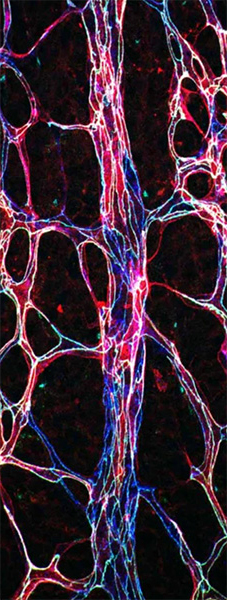Lena Claesson-Welsh – Vascular biology
We study how blood vessels are formed and which factors control the function of the blood vessels. A focus in the group is on how the components of the blood, fluid, proteins and cells, make their way through the blood vessel wall and leak out into the surrounding tissue. Leakage of fluid and small molecules is part of the normal circulation. In contrast, leakage from the blood of proteins and inflammatory cells in various diseases creates edema and inflammation, which promotes the disease development and worsens the prognosis.

In adults, formation of blood vessels normally does not occur, except for during wound healing and the menstrual cycle. But in a range of diseases there is an excessive formation of blood vessels that function poorly in various ways, such as in exaggerated permeability to large proteins and cells.
VEGF (vascular endothelial growth factor) is an important blood vessel stimulating factor. VEGF binds to specific receptors on the endothelial cell surface. The binding initiates intracellular signaling cascades, ultimately leading to the cells multiplying, migrating or increasing their permeability.
Regulation of blood vessel permeability
Several projects in the group deal with the permeability of blood vessels, i.e. the degree to which molecules and cells may pass from the blood to the tissue. Vascular permeability, which can be transient or permanent, can lead to edema and inflammation, thereby exacerbating disease states (cancer, eye diseases, and chronic inflammation) and complicating treatment. Blood vessel permeability also enables the spread of cancer to other parts of the body, metastasis. Substances that prevent blood vessel leakage can therefore restore homeostasis and suppress disease progression.
Read more about our research projects
Read more about Lena Claesson-Welsh as Wallenberg Scholar (in Swedish)
